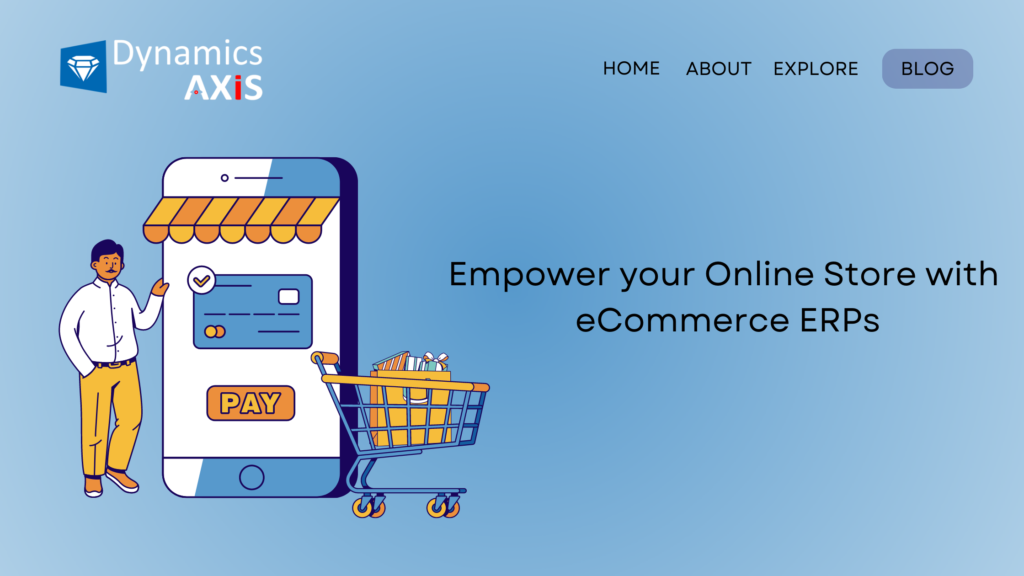Empower your Online Store with eCommerce ERPs
Empower your Online Store with eCommerce ERPs
Discover how eCommerce ERPs empower online stores to optimize operations and drive success in the digital marketplace

With the rise in digital business models, eCommerce has become a highly competitive market where only the best can survive. Online retailers face various hurdles in optimizing their operations for optimal efficiency and profitability. There are numerous areas that require flawless coordination and optimized workflows, ranging from inventory management and order processing to customer relationship management and analytics. This is where eCommerce Enterprise Resource Planning (ERP) systems come in to help your online store. Empower your Online Store with eCommerce ERPs
What are eCommerce ERPs?
eCommerce ERP integrations is the process of connecting an online store’s front end with the company’s backend ERP system. This integration syncs all business data across the two platforms, allowing you to view it all from a single place. Allowing theses two core business functionalities to work hand in hand drastically improves the overall efficiency and productivity.
The back end of online stores handle processing orders, payments, and managing stocks. Many businesses have separate ERP applications that handle essential functions such as supply chain and inventory management, budgeting, personnel management, as well as other critical aspects of business operations.
When an ecommerce platform is connected with an ERP platform, the two work together to assist managers in completing tasks. The ERP synchronizes all data in a single location. This synchronization can also automate current logistical procedures, considerably streamlining them and increasing efficiency.
Benefits of eCommerce ERPs
Inventory Management
To excel in the competitive eCommerce industry, optimizing inventory management is a critical area of interest. Implementing an ERP provides a centralized platform that integrates with various inventory management systems, allowing businesses to efficiently track and manage their stock. With real-time updates and automated inventory control features, online stores can avoid under or overstocking, thus minimizing extra costs and maximizing sales opportunities.
eCommerce ERPs also offer provide features such as forecasting, analyzing historical data and trends to accurately predict future demand. This empowers businesses to optimize their inventory levels, ensure timely restocking, and ultimately improve customer satisfaction by ensuring products are always available when needed.
Additionally, with features like barcode scanning and serial number tracking, eCommerce ERPs enable precise inventory control and streamlined warehouse operations.
Order Fulfillment and Processing
Efficient order processing and fulfillment are essential for online stores, and eCommerce ERP solutions play a crucial role in streamlining these operations. ERP systems enable online businesses to automate and optimize their order processing workflows. When a customer places an order, the ERP system automatically captures the details, triggers inventory updates, and initiates the fulfillment process.
Further, eCommerce ERPs facilitate efficient inventory allocation during order fulfillment. The system automatically checks inventory availability and allocates the necessary items to each order, ensuring accurate order fulfillment and reducing the chances of overselling. This level of automation and synchronization between order processing and inventory management minimizes errors, eliminates delays, and enhances the overall efficiency of the fulfillment process.
Customer Relationship Management (CRM)
CRM is an important component of running a successful online business, and eCommerce ERP solutions offer robust CRM functionalities that empower businesses to build and nurture strong customer relationships.
eCommerce ERPs enable businesses to capture and store customer information, including contact details, purchase history, preferences, and communication preferences. By serving as a centralized customer database, it provides a comprehensive understanding of each customer, their behavior, preferences, and needs. These valuable insights help businesses deliver personalized experiences, targeted marketing campaigns, and tailored promotions to enhance customer engagement and loyalty.
Moreover, eCommerce ERPs can also provide customer service and support functionalities, allowing businesses to track and resolve customer inquiries, issues, and complaints efficiently. The system logs customer interactions, enabling customer service teams to access complete histories and provide personalized assistance. This streamlined process enhances customer satisfaction and helps build long-lasting relationships.
Integration with Payment Gateways and Marketplaces
By integrating with marketplaces and payment gateways, eCommerce ERPs enable online stores to expand their reach, manage multichannel selling, and provide a secure and convenient payment experience.
eCommerce ERPs offer integrations with popular online marketplaces, such as Amazon, eBay, and Shopify. By connecting the ERP system with these platforms, businesses can manage their product listings, inventory, and orders from a single centralized dashboard. This eliminates the need for manual updates across multiple platforms and reduces the chances of overselling or stock discrepancies.
Additionally, eCommerce ERPs provide integrations with payment gateways, such as PayPal, Stripe, and Authorize.Net. Customers can choose from various payment options at the checkout, and the ERP system seamlessly communicates with the selected payment gateway to process the transaction. This integration ensures secure payment handling, reduces manual errors, and enhances the overall customer experience by providing a range of payment choices.
In conclusion, eCommerce ERP solutions are a game-changer for online stores, empowering them to optimize their operations and achieve greater efficiency. By streamlining inventory management, order processing and fulfillment, CRM, and integration with marketplaces and payment gateways, these powerful systems revolutionize the way online businesses operate. Embracing the power of eCommerce ERPs is a strategic move that allows online businesses to unlock their full potential, maximize profitability, and stay ahead in an ever-evolving digital market. With the right eCommerce ERP solution, your online store can optimize operations, seize opportunities, and thrive in the dynamic world of eCommerce.
